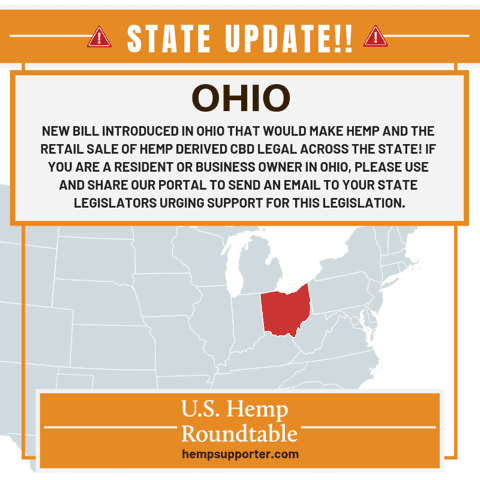Hemp was federally legalized December 20th, 2018 when President Trump signed the 2018 $867-billon dollar Farm Bill. It was originally introduced early in 2018 by U.S. Sen. Mitch McConnell. The language federally legalized the cultivation and sale of industrial hemp, which is defined as “marijuana” that contains less than 0.3-percent THC. It also removed it from the controlled substances list, allowing interstate commerce, production & production with approval from the USDA.
After 81 years the end of hemp prohibition is finally here & hemp is once again considered an agricultural commodity. As of this writing, 13 Hemp Cultivation & Processing licenses have already been awarded at the Federal level. Private stakeholders can now freely examine the plants properties and build the infrastructure needed to grow, process and make hemp based products. If you look at this globally, we are literally about to watch U.S. Hemp farmers change the world with new food, clothing, shelter & new innovation all while creating jobs domestically.
The 2018 Farm Bill puts the regulatory control of any new programs in the hands of the individual states. However, the U.S. Department of Agriculture must approve each state’s program before farmers can apply to their own state department of Agriculture for a growing or processing license before they can plant any new hemp.
40 states already have some type of hemp “pilot program” dating back to the original 2014 Farm Bill that allowed university-backed research programs. But because hemp remained a Schedule I substance, the DEA would go after any company if they tried any interstate commerce. This will also allow the new legal hemp industry to have access to banking, merchant services, credit card companies, e-commerce sites, advertising platforms, buy crop insurance, apply for federal grants & loans and write off expenses when filing their taxes.
The FDA still remains the biggest hurdle for any type of CBD or other hemp-derived cannabinoid to be infused in any consumable products like gummies, drinks or even pet products. In the FDA’s view, CBD is an active ingredient in Epidiolex and can’t be sold separately. Epidiolex is a pharmaceutical drug manufactured by GW Pharmaceuticals that is not hemp-derived, but is aimed at helping reduce & control epileptic seizures. It also costs $32,500 for a yearly supply.
While other states like New York & California have recently banned CBD in any type of infused edibles all together, the Ohio Board of Pharmacy made a determination in August of 2018 that made even hemp-derived CBD illegal & only allowed licensed Ohio medical marijuana dispensaries to sell CBD that was grown, processed & tested in Ohio. But Ohio now has a different approach – to legalize & regulate it. Hopefully with a reasonable entry price to allow for a true free market here in Ohio. Ohio Republican Sen. Steve Huffman said he would like to see hemp cultivation licenses have a fee of $500-$1000. This puts it in reach of every Ohioan and would allow a true free market, unlike the Ohio medical marijuana grow licenses that cost upwards of $200,000 in application & yearly renewal fees.
On Tuesday February 19th, 2019, Ohio has taken the initiative and introduce Ohio Senate Bill 57, which would create an industrial hemp program, legalize & regulate CBD. This Senate Bill was sponsored by Republicans Sen. Steve Huffman from Dayton, Sen. Brian Hill from Zanesville and their co-sponsors are Democrat Sen. Nickie Antonio from Lakewood & Sen. John Eklund a Republican from Munson Township. The program will be setup controlled by the Ohio Department of Agriculture. It has sponsors with both the republican & democrats.
Under Ohio S.B. 57
- The Ohio Department of Agriculture director would issue hemp cultivation licenses, which are valid for five years. People who have been convicted of a controlled substance felony in the past 10 years could not get licenses. Licensees would be required to have a procedure to test THC.
- The Ag department could randomly sample licensees’ plants to ensure the hemp is being grown for lawful purposes. Growers who violate the law would face a minor misdemeanor charge on the first offense and a fourth-degree misdemeanor on subsequent violations. On the third offense, growers would be ineligible to possess a license in the future.
- The Ohio Department of Ag and universities would be allowed to grow industrial hemp without a license.
- The public could possess, buy, sell, process and research hemp and hemp products without a license, according to the bill.
The bill specifies that hemp products include cosmetics, personal care items, food and dietary supplements, cloth, fiber, fuel, paint, paper, particleboard “and any product containing one or more cannabinoids derived from hemp, including cannabidiol, better known as CBD.â€
This type of clarification, legalization & regulation is severely needed to give proper direction to Ohio businesses who have been stocking CBD products for years and have only recently been threatened with having all of their CBD products embargoed if they weren’t removed from the shelves. Not wanting to face a raid and legal issues, most businesses complied. Sadly that leaves so many Ohioans who rely on CBD as a natural and effective way to combat so many ailments including inflammation, seizures, pain, anxiety & insomnia just to name a few.
The U.S. FDA will still have oversight when it comes to CBD in any consumable products, i.e. drinks, tinctures, salves etc. However there was serious and positive talk coming from the FDA Commissioner Scott Gottlieb before he recently resigned. He recently spoke at a special meeting in Crystal City Virginia, with the National Association of State Departments of Agriculture (NASDA) . Gottlieb says “We heard Congress loud & clear… Congress wants there to be a pathway for CBD to be available”. He also mentioned they have had a lot of pressure from the public to make this a top issue on Capital Hill since the 2018 Farm Bill passed. He also said “We’ll continue to warn consumers & take enforcement action to protect public health in regards to products that are not approved by the FDA and marketed with unproven claims about therapeutic benefits & could cause patients to forego necessary medical care for those ailments”. Gottlieb also said that CBD in food & dietary supplements remains unlawful and continues to be evaluated as a pharmaceutical substance (because as noted above, it’s an active ingredient in Epidiolex by GW Pharmaceuticals). The FDA must issue new regulations to change their policy and will hold a public meeting some time in April to initiate a rule-making procedure for regulating CBD products, but according to Gottlieb, this is not a “straightforward process”. The agency does plan to have an open forum for public comment on this topic.
This is the new cash-crop that Ohio farmers are so desperately in need of. Soybeans currently bring around $450 per acre while hemp will bring upwards of $60,000 per acre! The Ohio Farm Bureau Federation & Ohio Farmers Union both support hemp legalization in Ohio & here is even a newly formed, Ohio Hemp Association.
According to Hemp Biz Journal, the U.S. Hemp industry grew 16% in 2017 alone, with total industry sales reaching $820+ million. $190m were for Hemp-Derived CBD products, $181m were for personal care products and $137mm were for hemp food products. Food sales were led by the Snack Food category and Industrial Product sales were led by the Automotive category. Some market analysts anticipate a $1.9-billion dollar hemp industry by 2022 while other market analysts put the CBD industry alone at a $22-billon industry by 2022.
You can find out more and also how to contact your local state Senators & Congressman to keep the pressure on them to let them know the clear path is full legalization and regulation with an open & free market, including CBD by visiting U.S. Hemp Roundtable’s website. They are a lobbying group based out of Lexington, Kentucky & are constantly meeting with lawmakers throughout the country to change hemp laws.


